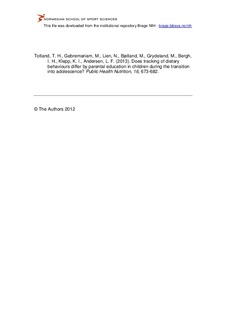| dc.contributor.author | Totland, Torunn Holm | |
| dc.contributor.author | Gebremariam, Mekdes K. | |
| dc.contributor.author | Lien, Nanna | |
| dc.contributor.author | Bjelland, Mona | |
| dc.contributor.author | Grydeland, May | |
| dc.contributor.author | Bergh, Ingunn Holden | |
| dc.contributor.author | Klepp, Knut-Inge | |
| dc.contributor.author | Andersen, Lene F. | |
| dc.date.accessioned | 2014-09-03T12:46:54Z | |
| dc.date.available | 2014-09-03T12:46:54Z | |
| dc.date.issued | 2012-07-09 | |
| dc.identifier.citation | Public Health Nutrition. 2013, 16, 673-682 | nb_NO |
| dc.identifier.uri | http://hdl.handle.net/11250/218695 | |
| dc.description | © The Authors 2012 | nb_NO |
| dc.description.abstract | Objective: The present study investigates the changes and tracking of dietary behaviours in Norwegian 11-year-olds and examines the association between parental education and dietary tracking over a time period of 20 months.
Design: Longitudinal data from the Norwegian HEalth In Adolescents (HEIA) cohort study followed up at three time points (2007–2009).
Setting: Intakes of fruits, vegetables and snacks were assessed by frequency and intakes of sugar-sweetened soft drinks and squash were assessed by frequency and amount. Tracking of dietary behaviours was assessed by adolescents’ relative position in rank over time and Cohen's kappa was used to measure tracking coefficients. Multinomial logistic regression analyses were performed to assess the association between parental education and the tracking of dietary behaviours.
Subjects: In total, 885 adolescents from the HEIA cohort study participated by answering Internet-based questionnaires at three time points.
Results: The results indicated that boys and girls maintained their relative position in rank of dietary intake over time, when grouped by baseline consumption. Fair to moderate tracking coefficients of dietary variables were observed. An inverse association was found between parental education and stability of soft drink and squash consumption during the 20 months.
Conclusions: The observed tracking pattern indicates the importance of promoting healthy dietary behaviours at an even earlier age. Furthermore, interventions should focus particularly on adolescents from families with low parental education and their consumption of sugar-sweetened beverages. | nb_NO |
| dc.language.iso | eng | nb_NO |
| dc.publisher | Cambridge University Press | nb_NO |
| dc.subject | adolescents | nb_NO |
| dc.subject | children | nb_NO |
| dc.subject | socio-economic status | nb_NO |
| dc.subject | stability | nb_NO |
| dc.subject | dietary behaviour | nb_NO |
| dc.title | Does tracking of dietary behaviours differ by parental education in children during the transition into adolescence? | nb_NO |
| dc.type | Journal article | nb_NO |
| dc.type | Peer reviewed | nb_NO |
| dc.subject.nsi | VDP::Medical disciplines: 700::Health sciences: 800::Nutrition: 811 | nb_NO |
| dc.source.journal | Public Health Nutrition | nb_NO |
| dc.description.localcode | Seksjon for idrettsmedisinske fag / Department of Sports Medicine | nb_NO |
